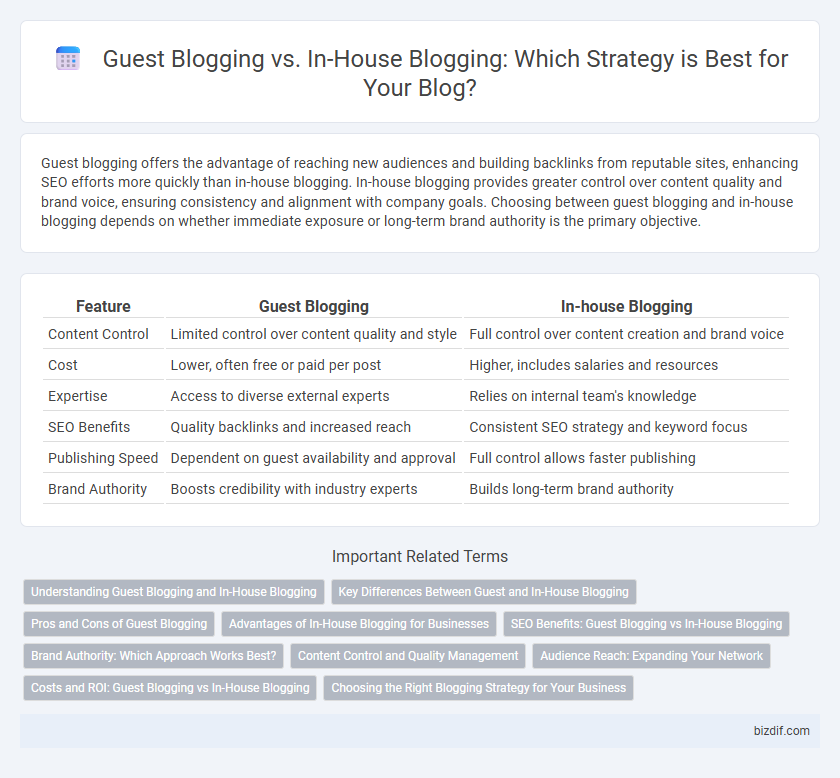Guest blogging offers the advantage of reaching new audiences and building backlinks from reputable sites, enhancing SEO efforts more quickly than in-house blogging. In-house blogging provides greater control over content quality and brand voice, ensuring consistency and alignment with company goals. Choosing between guest blogging and in-house blogging depends on whether immediate exposure or long-term brand authority is the primary objective.
Table of Comparison
| Feature | Guest Blogging | In-house Blogging |
|---|---|---|
| Content Control | Limited control over content quality and style | Full control over content creation and brand voice |
| Cost | Lower, often free or paid per post | Higher, includes salaries and resources |
| Expertise | Access to diverse external experts | Relies on internal team's knowledge |
| SEO Benefits | Quality backlinks and increased reach | Consistent SEO strategy and keyword focus |
| Publishing Speed | Dependent on guest availability and approval | Full control allows faster publishing |
| Brand Authority | Boosts credibility with industry experts | Builds long-term brand authority |
Understanding Guest Blogging and In-House Blogging
Guest blogging involves writing content for external websites to reach new audiences, build backlinks, and enhance brand authority, while in-house blogging is managed internally to maintain direct control over content strategy, consistent branding, and targeted messaging. Guest blogging provides opportunities for expanding online presence and tapping into established communities, whereas in-house blogging ensures alignment with company goals and deeper audience insights. Both strategies complement each other by balancing external exposure with internal expertise, optimizing overall content marketing effectiveness.
Key Differences Between Guest and In-House Blogging
Guest blogging involves contributing content to external websites, expanding brand reach and building backlinks, whereas in-house blogging relies on creating content within a company's own platform, ensuring consistent brand voice and full editorial control. Guest posts often provide increased exposure to new audiences and SEO benefits through external links, while in-house blogs prioritize long-term audience engagement and content authority. The key differences include content ownership, audience targeting strategies, and the balance between external influence and brand consistency.
Pros and Cons of Guest Blogging
Guest blogging expands your reach by tapping into established audiences and boosts SEO through valuable backlinks, but it requires careful vetting of contributors to maintain content quality and brand voice. It offers a cost-effective way to generate diverse content, yet inconsistent posting schedules and reliance on external writers can impact overall content strategy control. Balancing guest posts with in-house content ensures authenticity and alignment with business goals while benefiting from varied perspectives.
Advantages of In-House Blogging for Businesses
In-house blogging offers businesses complete control over content quality, brand voice, and publishing schedules, ensuring consistent alignment with marketing goals. It facilitates deeper integration with internal teams, allowing for timely updates on products, services, and company news that resonate authentically with the target audience. This approach also enhances SEO efforts by building domain authority through consistent, original content tailored specifically to the business's niche and customer interests.
SEO Benefits: Guest Blogging vs In-House Blogging
Guest blogging enhances SEO by generating high-quality backlinks from reputable external sites, boosting domain authority and referral traffic. In-house blogging supports consistent keyword optimization and brand control, strengthening site relevance and user engagement for organic search rankings. Combining both approaches leverages diverse backlink profiles and targeted content strategies, maximizing SEO impact.
Brand Authority: Which Approach Works Best?
Guest blogging boosts brand authority by leveraging established audiences and third-party credibility, which accelerates trust and visibility in niche markets. In-house blogging allows for consistent brand voice and deep expertise, strengthening long-term authority through tailored, company-specific insights. Combining both approaches often yields the strongest brand authority by balancing external validation with authentic, controlled content.
Content Control and Quality Management
Guest blogging offers limited content control as external contributors create posts, which may lead to inconsistent quality and brand voice. In-house blogging provides full control over editorial standards, enabling precise quality management and alignment with the company's messaging strategy. Effective quality control in in-house blogging ensures content relevance, SEO optimization, and maintains the brand's authority in its niche.
Audience Reach: Expanding Your Network
Guest blogging leverages established platforms to access diverse and larger audiences, enhancing brand visibility across multiple niche communities. In-house blogging maintains direct control over content and fosters a loyal, engaged audience within your own domain, strengthening brand authority. Combining guest and in-house blogging strategies maximizes audience reach by balancing broad exposure with targeted, consistent communication.
Costs and ROI: Guest Blogging vs In-House Blogging
Guest blogging often involves lower upfront costs since it leverages external contributors, reducing expenses related to content creation and staff salaries. In-house blogging requires investment in dedicated writers, editorial resources, and ongoing content management, which can increase costs but may offer better control over brand messaging. The ROI of guest blogging depends on audience reach and backlink quality, while in-house blogging typically yields higher long-term value through consistent branding and content ownership.
Choosing the Right Blogging Strategy for Your Business
Guest blogging leverages external expertise and expands your brand's reach by tapping into established audiences, while in-house blogging maintains full control over content quality and aligns closely with your company's voice. Selecting the optimal blogging strategy depends on factors such as resource availability, content goals, and target audience engagement. Businesses aiming for rapid exposure may benefit from guest blogging, whereas those focused on consistent brand messaging might prioritize in-house blogging.
Guest blogging vs In-house blogging Infographic

 bizdif.com
bizdif.com